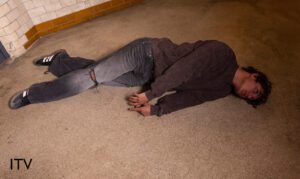 Epilepsy Action highlights “sad reality” after Brody is denied his epilepsy medication at the secure training centre (STC) in tonight’s episode of Coronation Street.
Epilepsy Action highlights “sad reality” after Brody is denied his epilepsy medication at the secure training centre (STC) in tonight’s episode of Coronation Street.
The youngster, played by Ryan Mulvey, is detained again after harassing STC teacher Daniel Osbourne (Rob Mallard) at the Roy’s Rolls café and is spotted by DS Lisa Swain (Vicky Myers). He antagonises her and is taken back to STC.
When his belongings are confiscated, he refuses to tell DS Swain what the tablets in his pocket are, and they are taken away.
Later in the episode, he asks for them back, saying it’s his medication. But DS Swain has walked away before he says he has epilepsy. He then has another seizure in the cell.
This follows on from last week’s episode, when Brody’s epilepsy was introduced to viewers after he had a seizure around the corner from the Rovers Return pub.
Treated poorly
 Chantal Spittles, PR and media manager at Epilepsy Action said it was “shocking” to see Brody’s seizure in STC and how he gets dismissed by DS Swain in the episode.
Chantal Spittles, PR and media manager at Epilepsy Action said it was “shocking” to see Brody’s seizure in STC and how he gets dismissed by DS Swain in the episode.
“We know this can be the sad reality for many, who’ve been treated really poorly by either the police or while in prison.
“Some have even died as a result of not getting the proper care and support they need to manage their seizures.”
Epilepsy Action has been calling for more awareness of epilepsy among police and prison staff to help prevent avoidable deaths in custody and prison. It featured this issue as a part of its 2024 manifesto ahead of the UK elections.
Chantal added: “It’s unsurprising that many people like Brody feel they can’t talk about their epilepsy for fear of how people will react. It’s time to change that by talking about the condition, let’s normalise it and help others to understand.”
Tackling this issue, the organisation has today launched its ‘If I told you…’ campaign. This highlights some reasons why people can find it difficult to talk about their epilepsy. It calls on the general public to learn a bit more about how to support people with epilepsy to help them feel more comfortable opening up.
More articles







